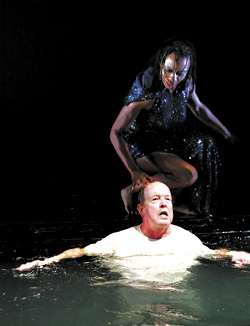We hold these stereotypes to be self-evident: that all Latin men are passionate to an almost comical degree, good at the tango, given to broad gestures of seduction and hot-blooded poetry, and easily driven to volcanic tears when expatriate conversation turns to El Jefe or la patria (insert given humid homeland); and, moreover, that widowed white women are neurotic, chatty, frizzy-haired, and as squirmily hot and bothered as dogs, slow to boil but ultimately easy to fuck, especially if you are a (see above) Latin man.
There is, of course, usually a grain of truth to any stereotype, and a work of art which trucks unmaliciously in cultural generalities, such as playwright Robert Schenkkan’s By the Waters of Babylon at the Rep, should be given some leeway. We must, after all, find some common ground. The first half of Schenkkan’s romantic drama, however, is so chock-full of easy assumptions about its two characters that it’s almost telegraphically predictable. One begins to wonder what exactly the point is. Suzanne Bouchard, as the widow Catherine, and Armando Duran, as Cuban emigré Arturo—a writer-cum-gardener hired to clear her chaotic thatch of overgrown (and highly symbolic) yard—keep the proceedings lively, making the most of Schenkkan’s well-honed and often funny dialogue and managing to eke a modicum of sexual tension out of their by-the-numbers predicament.
Still, around the time that Arturo—one hand splayed loosely on his stomach and the other posed jauntily in the air, his feet shuffling 1-2-3—tries to teach his skittish host/employer the rhythmic roots of Latin dance, one begins to look for the appearance of, say, a stalking immigration official in a rumpled blue suit (Tommy Lee Jones?) or a jealous, hungover, boat-builder boyfriend (Russell Crowe?) come to reclaim the woman he desperately needs but occasionally beats up. It goes without saying that after a prolonged waltz of getting-to-know-you, Arturo and Catherine come together in a moment of unbridled passion; the only shock is that no fabric is torridly torn, no buttons popped.
Schenkkan, a local, is a writer of considerable talent—he’s got a cabinet full of awards, including a Pulitzer—but he’s building on some pretty used-up real estate here. And when a stunner of an about-face is revealed in the second act, one senses that even he realized the threadbareness of his premise. So when in doubt, get nasty, brutish, and loud. Spoiler alert: The first act’s psychic discomfort becomes, literally, a gun in the second, as Schenkkan muscles his story from a literate bodice-ripper into a sort of neo-gothic noir that rattles the stage with cognitive dissonance. Catherine, freshly screwed and vulnerable as a baby seal, goes totally apeshit. She screams. She crawls on the floor. She pulls a gun on Arturo, then herself. Bang! What a woman! (Recall, if you will, Nelson Algren’s three rules for good living: Never play cards with a man named Doc, never eat at a place called Mom’s, and never sleep with a woman who has more problems than you do.) It’s not all her, though. Arturo, shirtless and up to his neck in shit, has his own demons to overcome: He is, after all, suffering from severe writer’s block.
Directed by Richard Seyd, this production does everything it can to succeed. Duran and Bouchard throw themselves headfirst into their roles, and together they bring a convincing note of naturalism and romantic sincerity to Schenkkan’s writing that often works to overcome the limitations of the dog-tired characterizations. Michael Ganio’s swampy-looking Southern stage design, foregrounded by an overgrowth of Texas weeds set against a stormy-looking sky, creates an appropriately humid and tangled atmosphere, and the second-act transition to the dark and foreboding confines of Catherine’s bedroom is achieved without a hitch. All in all, it’s a wonder Babylon is as entertaining as it is—chalk it up to the effort of everyone involved. Too bad they only had a cartoon of reality to work with.








